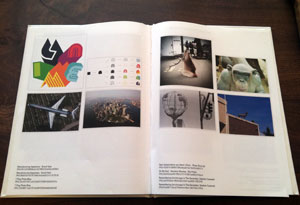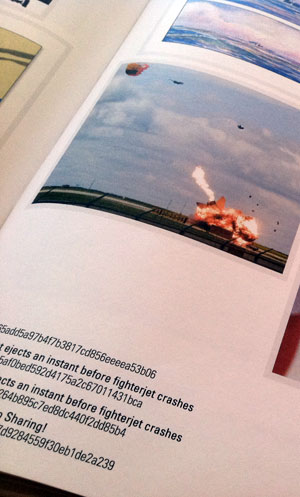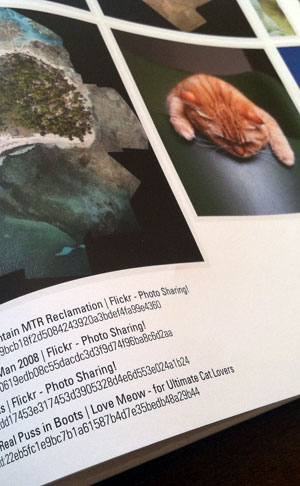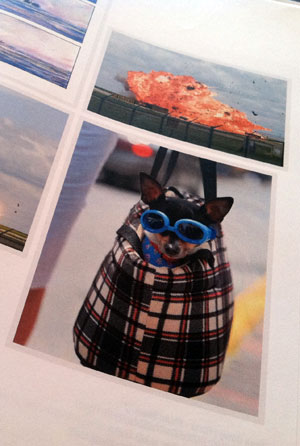tecznotes
Michal Migurski's notebook, listening post, and soapbox. Subscribe to ![]() this blog.
Check out the rest of my site as well.
this blog.
Check out the rest of my site as well.
Jun 16, 2011 6:14am
parting gifts
I jumped on the @towerbridge teacup-outrage bandwagon fairly early, so I’ve had a few days to think about how Twitter could have improved their response to the situation.
Meanwhile, this arrived:
Coming up on a few years of joining and leaving online services, I’ve become interested in graceful exits. What responsibilities does a Flickr or Facebook have when you decide to move elsewhere, or simply stop sharing some aspect of your life? So much effort goes into user acquisition and new account creation, so little into the sunset process.
After a few years on image-sharing service Ffffound!, I moved my activity to the more-explicitly social and more account-having Pinterest. There are friends there, you can comment on other people’s pictures, and if you decide to use it as-advertised you can track pictures of things you might want to buy. Hello Pinterest, goodbye Ffffound!. Still, I’d been using Ffffound! since 2007 and amassed something like 5,500 images—about five per day or one every five hours. What to do with all that stuff? Inspired by James Bridle’s work with printed recordings of ephemeral data streams and the U.K.-based Newspaper Club, a bound printed book seemed like the obvious thing.
Produced with Lulu and a bit of PDF-bashing code, I created a multi-volume print of everything I ever posted. The images here are from the color proof print that showed up at the office on Tuesday. The real thing will be somewhere in the neighborhood of 1,400 pages, probably spread over four volumes, with a hardback cover and hopefully capable of surviving the death of Ffffound! and all of its stable hash identifiers. It will contain everything I know about every image: the web page it came from, a title if there was one, and the highest quality version of the original image I can find.
The complete image and data collection is close to 700MB, so with a bit of compression I could probably cram it all onto a CD and stick that in the back—animated GIFs of popular rappers don’t print well.
Twitter eventually did right by Tom when they reinstated the old Tower Bridge bot under a different name, but it really only came together after a weekend’s worth of unhappiness from its fans. Assuming that the only way to respond to a trademark claim from a London event space was to unilaterally reassign Tom’s account, Twitter should have planned a less robo-legal approach to moving people around. If the content of the account (as opposed to its name) was not a violation of the terms of service, they should have changed the name and informed Tom. If the content of the account was itself a problem, they should have collected it into a downloadable form such as a spreadsheet or zip file, and shipped that to Tom along with notice of his termination. I understand the complexity of online service legal concerns, but the perils of reasoning by stereotype mean that genuinely brilliant creations like the original @towerbridge can be easily (and irreversibly) abused by the process.
Back to books, Craig Mod describes the post-artifact book:
A system of unlocking. A system concerned with engagement. Sharing. Marginalia. Ownership. Community. And, of course, reading. It’s the system that transforms the book from isolated vessel for text into a shared interface. It’s a system that’s beginning to appear in fits and starts in reading applications we use today. It’s the system most directly connected with readers. And it’s a system that, when executed well, makes going back to printed books feel positively neutered.
Neutered or not, leaving a living, breathing service is a valid step in the opposite direction, from post-artifact to post-service artifact, to a parting gift.




Comments (4)
Ever since I saw James Bridle's talk at sxsw '09 I wanted to do likewise with all my tweets & fb posts, been thinking about this increasingly as the platform shifts and failings seem to happen more often now. Archiving flux seems fitting, reflective, while also demonstrating this tension between attachment to objects and illusory stability in a hyper-changing world vs. being in the flow, awake in the present.
Posted by danlatorre on Thursday, June 16 2011 8:02pm UTC
Would you be willing to share the code you used to transfer the images to pdf files so others could create books for themselves?
Posted by hubs on Thursday, June 16 2011 11:04pm UTC
Dan - thanks! Hubs - Yes. I wrote an offboard API for Ffffound a few years ago, you can find that at http://ffffound.teczno.com/. The rest of it, I'll post when I've ironed out some bugs and gotten the real books printed.
Posted by Michal Migurski on Friday, June 17 2011 12:40am UTC
No RSS on Pinterest? http://pinterest.com/migurski/michal-s-style-pinboard/ :-(
Posted by Michael P. on Saturday, July 2 2011 4:30am UTC
Sorry, no new comments on old posts.